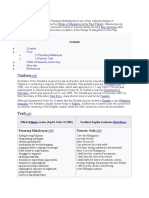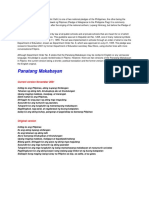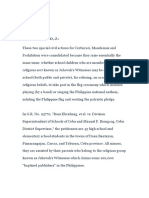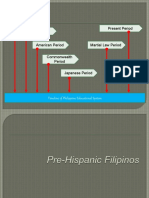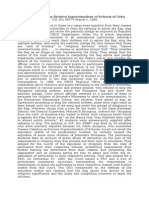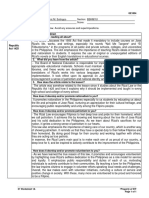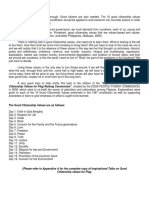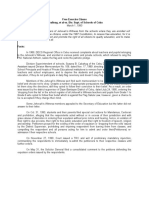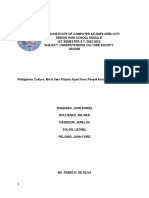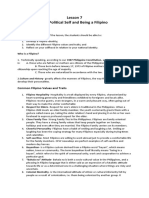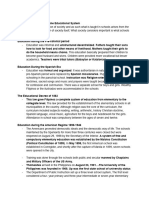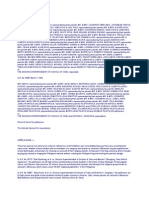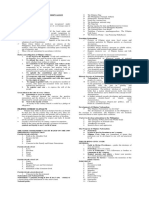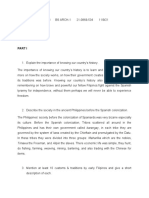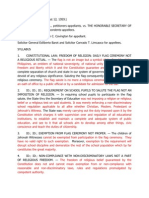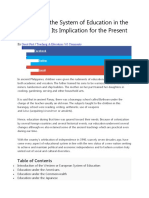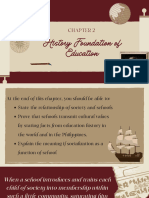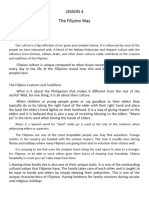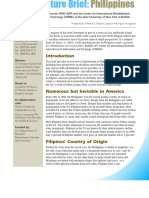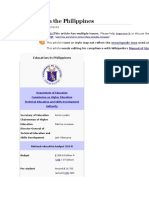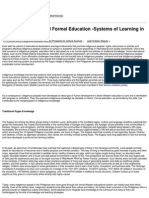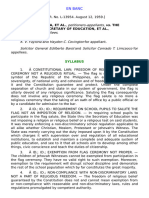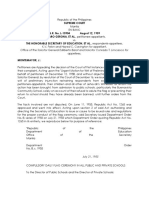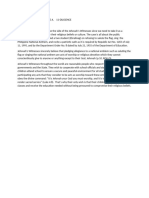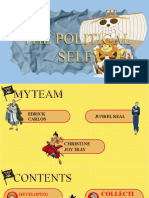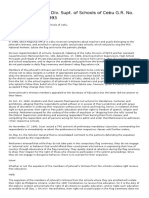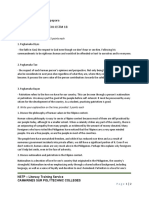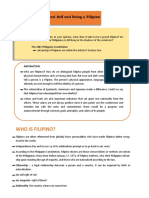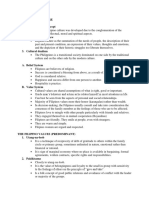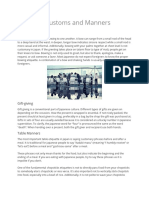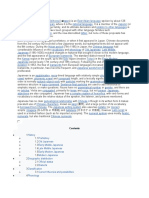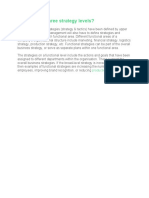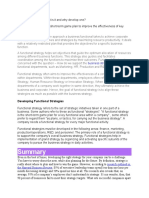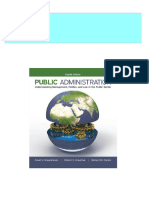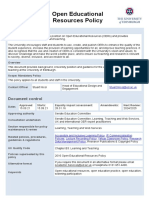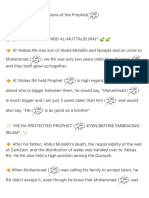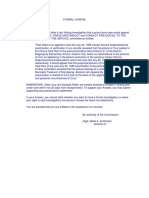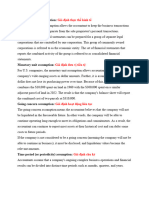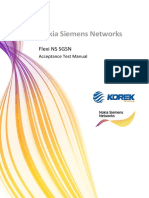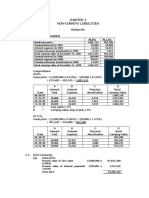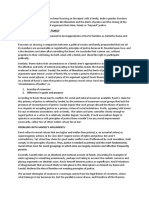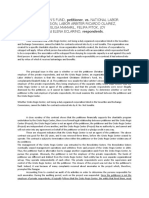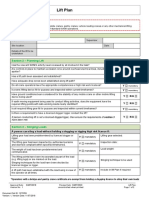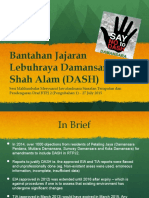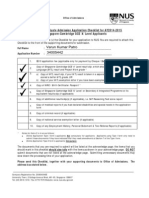Patriotic Oath (Philippines) : Custom
Patriotic Oath (Philippines) : Custom
Uploaded by
Reynalynne Caye MagbooCopyright:
Available Formats
Patriotic Oath (Philippines) : Custom
Patriotic Oath (Philippines) : Custom
Uploaded by
Reynalynne Caye MagbooOriginal Title
Copyright
Available Formats
Share this document
Did you find this document useful?
Is this content inappropriate?
Copyright:
Available Formats
Patriotic Oath (Philippines) : Custom
Patriotic Oath (Philippines) : Custom
Uploaded by
Reynalynne Caye MagbooCopyright:
Available Formats
Patriotic Oath (Philippines)
From Wikipedia, the free encyclopedia
Jump to navigationJump to search
The Patriotic Oath (Tagalog: Panatang Makabayan) is one of two national pledges of
the Philippines, the other being the Pledge of Allegiance to the
Flag (Tagalog: Panunumpa ng Katapatan sa Watawat). It is commonly recited at flag
ceremonies of schools—especially public schools—immediately after singing
the Philippine national anthem but before reciting the Pledge of Allegiance to the Flag.
Contents
1Custom
2Text
o 2.1Panatang Makabayan
o 2.2Patriotic Oath
31993 JW students controversy
4See also
5References
Custom[edit]
Recitation of the Panatà is required by law at all public and private educational
institutions. By custom, this is observed in institutions meant for Filipinos or containing a
majority of Filipino nationals. This guideline was set in Republic Act No. 1265, one of
many national symbols laws, which was approved on July 11, 1955. [1] The act was
implemented in schools through Department Order No. 8 of what is now the Department
of Education, which was approved on July 21, 1955. The Panatà was revised in
November 2001 by then Secretary of Education Raul Roco, using shorter lines in less
formal Tagalog.
Although Department Order No. 8 states that the Panatà may be recited in English or
any Philippine language, the Panatà is usually recited today in Tagalog, of which two
versions exist: the current text is a shorter rendering of the English original, while the
older version is a more direct translation.
Text[edit]
Official Tagalog version (DepEd Order 54-2001) Unofficial English translation (Raul Roco)
Panatang Makabayan[edit] Patriotic Oath[edit]
Iniibig ko ang Pilipinas, I love the Philippines,
aking lupang sinilangan, my land of birth,
tahanan ng aking lahi; home of my race.
kinukupkop ako at tinutulungan
maging malakas, masipag at marangal.
Dahil mahal ko ang Pilipinas, I am protected by it and aided
diringgin ko ang payo to become strong, industrious and honorable.
ng aking magulang, Since I love the Philippines,
susundin ko ang tuntunin ng paaralan, I shall heed the counsel of my parents,
tutuparin ko ang tungkulin I shall obey the rules of my school,
ng mamamayang makabayan: I shall fulfill the duties of a patriotic citizen,
naglilingkod, nag-aaral at nagdarasal serving, studying, and praying with utter fidelity.
nang buong katapatan. I offer my life, dreams, and striving
Iaalay ko ang aking buhay, to the Philippine nation.[3]
pangarap, pagsisikap
sa bansang Pilipinas.[2]
1993 JW students controversy[edit]
In 1993, sixty-eight students from the organization Jehovah's Witnesses (JW) were
expelled from a school in Cebu for their failure to salute the flag, sing the Philippine
National Anthem, and recite the patriotic oath. A teacher in the same school, also a JW
adherent was fired from her job for the same offense. According to JW teachings, flag
ceremonies, flag salutes, and patriotic oaths are viewed as acts of worship or religious
devotion, the latter two of which they believe can only be rendered to God alone and not
anyone nor anything. The JW's consider the flag an image and honoring the flag
idolatry.
The case was brought to court wherein the Cebu Division Superintendent argued that
the students and the teacher violated Republic Act No. 1265, the law that makes flag
ceremony compulsory for all schools, citing the case of Gerona et al v. Secretary of
Education.[4] Superintendent also argued of separation of church and state, stating the
flag is devoid of religious significance and does not involve any religious ceremony, and
that giving JW's right to exemption disrupt school discipline and demoralize the rest of
the school population which by far constitutes the great majority.
The Court ruled in favor of the expelled JW students and the fired JW teacher, on the
grounds that expulsion due to religious beliefs is invalid. [5] They also stated of freedom of
religion in the 1987 Constitution of the Philippines:
Religious freedom is a fundamental right which is entitled to the highest priority and the
amplest protection among human rights, for it involves the relationship of man to his
Creator. [...] The right to religious profession and worship has a two-fold aspect, vis.,
freedom to believe and freedom to act on one's belief. The first is absolute as long as
the belief is confined within the realm of thought. The second is subject to regulation
where the belief is translated into external acts that affect the public welfare. [...] The
sole justification for a prior restraint or limitation on the exercise of religious freedom [...]
is the existence of a grave and present danger of a character both grave and imminent,
of a serious evil to public safety, public morals, public health or any other legitimate
public interest, that the State has a right (and duty) to prevent.
Evidence also showed that even if they do not take part in the compulsory flag
ceremony, they never engaged in "external acts" or behavior that would offend the
people who believe in expressing their love of country through the observance of the
flag ceremony. The expelled only quietly stood at attention during the flag ceremony to
show their respect for the right of those who choose to participate in the solemn
proceedings.
The students were later allowed to re-enroll in the school they were expelled from and
the teacher was allowed to resume her duties.
See also[edit]
Flag of the Philippines
References[edit]
1. ^ "REPUBLIC ACT NO. 1265 – AN ACT MAKING FLAG CEREMONY COMPULSORY IN
ALL EDUCATIONAL INSTITUTIONS". RP Government. June 11, 1955. Retrieved September
26, 2007.
2. ^ "DO 54, S. 2001 – THE REVISED PANATANG MAKABAYAN" (PDF). Department of
Education, Republic of the Philippines. November 12, 2001. Retrieved July 1, 2021.
3. ^ "Learning to be hypocrites from the Patriotic Oath". The Manila Times. June 11, 2014.
4. ^ "Philippine High Court ruling in Genaro Gerona, et al. vs The Honorable Secretary of
Education, et al". August 12, 1959.
5. ^ "RP Supreme Court ruling in Roel Ebralinag, et al. vs Superintendent of Schools of Cebu".
March 1, 1993.
You might also like
- Custom: Lupang HinirangDocument3 pagesCustom: Lupang HinirangRalph Granil QuieroNo ratings yet
- The Panatang MakabayanDocument1 pageThe Panatang MakabayanVerleen OrquiolaNo ratings yet
- ROEL EBRALINAG, EMILY EBRALINAG, Represented by Their Parents MR. & MRS. LEONARDO EBRALINAGDocument8 pagesROEL EBRALINAG, EMILY EBRALINAG, Represented by Their Parents MR. & MRS. LEONARDO EBRALINAGReginaNo ratings yet
- CWTS Written ReportDocument2 pagesCWTS Written Reportclumsy1657% (7)
- 95770Document34 pages95770张丽红0% (1)
- Unit-2.docx CRI319Document22 pagesUnit-2.docx CRI319vworldpeace yanibNo ratings yet
- Ed 304 - ReportDocument23 pagesEd 304 - ReportLiezl Odeña Culanibang100% (1)
- Ebralinag vs. DivisionDocument7 pagesEbralinag vs. DivisionjhvnNo ratings yet
- Historical Foundation of EducationDocument4 pagesHistorical Foundation of EducationNorlanie Ayaon IINo ratings yet
- Historical Foundation of Philippine EducationDocument29 pagesHistorical Foundation of Philippine EducationFrance FuertesNo ratings yet
- Ebralinag Vs SDS CebuDocument3 pagesEbralinag Vs SDS CebugerwinryanrabayaNo ratings yet
- Report ZyraDocument22 pagesReport ZyraDannah Mae ResurreccionNo ratings yet
- Unit 2 Topic 5 POLITICAL SELFDocument3 pagesUnit 2 Topic 5 POLITICAL SELFjbenedictaNo ratings yet
- 01 - Worksheet - 1A RIZALDocument1 page01 - Worksheet - 1A RIZALAdonis CapaldiNo ratings yet
- Philippine Education System PRESENTED BY ARIS RENZ SANGALANGDocument44 pagesPhilippine Education System PRESENTED BY ARIS RENZ SANGALANGaris renz sangalangNo ratings yet
- Topic 10 - The Political and Patriotic SelfDocument3 pagesTopic 10 - The Political and Patriotic SelfRaiza Rafael RoblesNo ratings yet
- Professional Education 9 Module Five Major Foundations of Curriculum (Historical Foundation of Curriculum)Document6 pagesProfessional Education 9 Module Five Major Foundations of Curriculum (Historical Foundation of Curriculum)shielaNo ratings yet
- Lesson 2 - Good Citizenship ValuesDocument4 pagesLesson 2 - Good Citizenship ValuesHannah TotohNo ratings yet
- Sign Language in The PhilippinesDocument6 pagesSign Language in The Philippinesjunjun gallosaNo ratings yet
- Ebralinag, Et Al vs. Div. Supt. of Schools of Cebu: Free Exercise ClauseDocument3 pagesEbralinag, Et Al vs. Div. Supt. of Schools of Cebu: Free Exercise ClauseJoannah GamboaNo ratings yet
- EDUC 6 Historical FoundationsDocument31 pagesEDUC 6 Historical FoundationsJeru ElbanbuenaNo ratings yet
- Historical and Sociological FoundationsDocument11 pagesHistorical and Sociological FoundationsCreistel KhayNo ratings yet
- USCDocument6 pagesUSCOLSH Capitol ParishNo ratings yet
- Lesson 4: The Political Self and Being FilipinoDocument26 pagesLesson 4: The Political Self and Being FilipinoJonnel Lumangyao JrNo ratings yet
- Republic Act 1425 The Jose Rizal Law by SirJanDocument11 pagesRepublic Act 1425 The Jose Rizal Law by SirJanRay John DulapNo ratings yet
- GEC SELF Lesson7-Activity7Document3 pagesGEC SELF Lesson7-Activity7Hannah Lee LumosbogNo ratings yet
- Module 5Document9 pagesModule 5Kentjohn QuiraoNo ratings yet
- Tvet SystemDocument27 pagesTvet SystemAlvin Patiño100% (1)
- Philippine History1Document9 pagesPhilippine History1Mechelle Landicho BacayNo ratings yet
- Ebralinag CaseDocument11 pagesEbralinag CaseVictor LimNo ratings yet
- Nationalism and Good Citizenship ValuesDocument3 pagesNationalism and Good Citizenship ValuesIssa ChavezNo ratings yet
- Clarisse Lumapas R3 - (Activity Title) Activity No. 2Document7 pagesClarisse Lumapas R3 - (Activity Title) Activity No. 2Nicole LumapasNo ratings yet
- Gerona Vs Sec of Education GR L-13954Document22 pagesGerona Vs Sec of Education GR L-13954Leomar Despi LadongaNo ratings yet
- A History of The System of Education in The Philippines - Its Implication For The Present GenerationDocument6 pagesA History of The System of Education in The Philippines - Its Implication For The Present GenerationMary Grace ValenciaNo ratings yet
- Topic 9 Polititical SelfDocument3 pagesTopic 9 Polititical SelfMark Rolando Semaña TabbuNo ratings yet
- Nationalism and Patriotism 2019Document67 pagesNationalism and Patriotism 2019Andrea Paz100% (1)
- Gerona Vs Secretary of EducationDocument14 pagesGerona Vs Secretary of Educationwiggie27No ratings yet
- Simple Red and Beige Vintage Illustration History Report PresentationDocument29 pagesSimple Red and Beige Vintage Illustration History Report Presentationnikkilouisenobleza20No ratings yet
- Ethics The Filipino WayDocument14 pagesEthics The Filipino Waybatajean735No ratings yet
- Philippines History and Public ServiceDocument75 pagesPhilippines History and Public ServiceJP FūlgëncîöNo ratings yet
- Interview and Definition of Curicuralists, Etc.Document9 pagesInterview and Definition of Curicuralists, Etc.Joy A. VisitacionNo ratings yet
- Asian Culture Brief PhilippinesDocument4 pagesAsian Culture Brief Philippinessafira QueenNo ratings yet
- Education in The PhilippinesDocument46 pagesEducation in The PhilippinesMark Púgnit Bonábon100% (1)
- Abayao - Ifugao Knowledge and Formal EducationDocument4 pagesAbayao - Ifugao Knowledge and Formal EducationfrasioNo ratings yet
- Gerona v. Secretary of EducationDocument19 pagesGerona v. Secretary of EducationBernard BeldadNo ratings yet
- Supreme CourtDocument18 pagesSupreme Courtkate joan madridNo ratings yet
- Case DigestDocument1 pageCase DigestJoanna Marie MagistradoNo ratings yet
- Mindanao Polytechnic College: Crossing Makar, General Santos City Telephone No. (083) 552-2671Document10 pagesMindanao Polytechnic College: Crossing Makar, General Santos City Telephone No. (083) 552-2671keith tambaNo ratings yet
- Template One Piece Special 1000 EpisodeDocument37 pagesTemplate One Piece Special 1000 EpisodeGm GoldNo ratings yet
- Lesson 1Document91 pagesLesson 1Christian GumarangNo ratings yet
- Ebralinag, Et Al vs. Div. Supt. of Schools of Cebu G.R. No. 95770, March 1, 1993Document2 pagesEbralinag, Et Al vs. Div. Supt. of Schools of Cebu G.R. No. 95770, March 1, 1993Jon Santiago100% (1)
- NAME: Julia Ysabelle Alpapara Course, Year & Section: BSTM 1BDocument2 pagesNAME: Julia Ysabelle Alpapara Course, Year & Section: BSTM 1BYsa RebelNo ratings yet
- The Historical Background of EducationDocument44 pagesThe Historical Background of EducationCarl Justin BingayanNo ratings yet
- The Political Self and Being A FilipinoDocument13 pagesThe Political Self and Being A FilipinohilichurlNo ratings yet
- Political SelfDocument3 pagesPolitical SelfAaron VillaflorNo ratings yet
- ED 230 (A History of The System of Education in The Philippines)Document13 pagesED 230 (A History of The System of Education in The Philippines)YZA BAYANo ratings yet
- Euthenics 2Document4 pagesEuthenics 2Shine ZurcNo ratings yet
- Indigenous Cultures Today: Protecting Native Families and Practicing Cultural TraditionsFrom EverandIndigenous Cultures Today: Protecting Native Families and Practicing Cultural TraditionsNo ratings yet
- Crossing the Border: West Papuan Refugees and Self-Determination of PeoplesFrom EverandCrossing the Border: West Papuan Refugees and Self-Determination of PeoplesNo ratings yet
- Top Japanese CultureDocument11 pagesTop Japanese CultureReynalynne Caye MagbooNo ratings yet
- Japanese Customs and MannersDocument3 pagesJapanese Customs and MannersReynalynne Caye MagbooNo ratings yet
- Japanese (日本語, Nihongo: listenDocument10 pagesJapanese (日本語, Nihongo: listenReynalynne Caye MagbooNo ratings yet
- What Are The Three Strategy LevelsDocument1 pageWhat Are The Three Strategy LevelsReynalynne Caye MagbooNo ratings yet
- Business Strategy: Developing Functional StrategiesDocument3 pagesBusiness Strategy: Developing Functional StrategiesReynalynne Caye MagbooNo ratings yet
- Aud 2Document7 pagesAud 2Raymundo EirahNo ratings yet
- Full Public Administration Understanding Management Politics and Law in The Public Sector David H. Rosenbloom Ebook All ChaptersDocument62 pagesFull Public Administration Understanding Management Politics and Law in The Public Sector David H. Rosenbloom Ebook All Chaptersabusoharpaz100% (3)
- The End of Philosophy, The Origin of IdeologyDocument4 pagesThe End of Philosophy, The Origin of IdeologyAlex DuqueNo ratings yet
- CT Commercial Investment PropertiesDocument25 pagesCT Commercial Investment PropertiesbritalbNo ratings yet
- Asas Legalitas LTDDocument7 pagesAsas Legalitas LTDWidiya ftrNo ratings yet
- Code of Conduct For Public Officers Under The PPA 2007Document5 pagesCode of Conduct For Public Officers Under The PPA 2007naconnetNo ratings yet
- Lease AgreementDocument13 pagesLease AgreementSaief AhmadNo ratings yet
- Open Educational Resources Policy: Document ControlDocument4 pagesOpen Educational Resources Policy: Document ControlArsh AhmadNo ratings yet
- ? Lesson 22 Companions of The Prophet ( )Document4 pages? Lesson 22 Companions of The Prophet ( )Thierno AbdoulayeNo ratings yet
- 1st Responder Training JCF Staff Colege DInsp.C J ClarkeDocument95 pages1st Responder Training JCF Staff Colege DInsp.C J ClarkeKay-Ann ThomasNo ratings yet
- Arthur Andersen ColapseDocument21 pagesArthur Andersen ColapseRagil RamadhaniNo ratings yet
- Formal Charge Supreme CourtDocument1 pageFormal Charge Supreme CourtJose DulaNo ratings yet
- Aff Complaint DILGDocument4 pagesAff Complaint DILGBrandon DangatagNo ratings yet
- Acct Principles and Assumption - Week1Document10 pagesAcct Principles and Assumption - Week1Linh KhánhNo ratings yet
- Property Law Project Avinash TiwariDocument31 pagesProperty Law Project Avinash TiwariAvinash TiwariNo ratings yet
- Flexi NS - Acceptance Test CasesDocument69 pagesFlexi NS - Acceptance Test CasesLuthfi ZulkifliNo ratings yet
- Legal Forms and Practical Exercises by Carmencita C. DabuDocument28 pagesLegal Forms and Practical Exercises by Carmencita C. DabuGlem Josol100% (4)
- Answers - Chapter 2 Vol 2 RvsedDocument13 pagesAnswers - Chapter 2 Vol 2 Rvsedjamflox100% (3)
- Justice, Conflict and WellbeingDocument360 pagesJustice, Conflict and WellbeingKatherine Kath100% (1)
- Relationship ContractDocument3 pagesRelationship ContractSuper Fly100% (1)
- EPM Assignment 2021 AllDocument5 pagesEPM Assignment 2021 Allswati0% (1)
- Justice and The Idealized FamilyDocument2 pagesJustice and The Idealized FamilyAditi SinghNo ratings yet
- PPT-7 Depository ServicesDocument49 pagesPPT-7 Depository Servicesankurchauhan9304No ratings yet
- InvoiceDocument1 pageInvoiceShaurya TrivediNo ratings yet
- CHRISTIAN CHILDREN v. NLRCDocument2 pagesCHRISTIAN CHILDREN v. NLRCKaren Selina AquinoNo ratings yet
- Lift Plan Permit FormDocument2 pagesLift Plan Permit FormFadly HafizNo ratings yet
- DASH - RTPJ2 HearingDocument14 pagesDASH - RTPJ2 Hearingmanimaran75No ratings yet
- 'A' Level Application Checklist 2013Document1 page'A' Level Application Checklist 2013varunpatroNo ratings yet
- Assignment 1 MAE101 T2 2023Document7 pagesAssignment 1 MAE101 T2 2023ANSHU MAURYANo ratings yet
- Name:Diana WangamatiDocument5 pagesName:Diana WangamatiDiana WangamatiNo ratings yet
